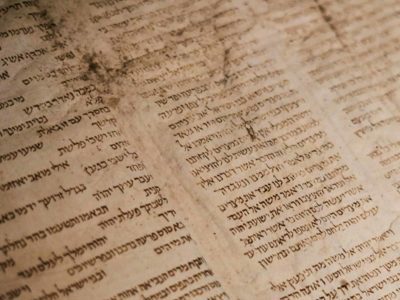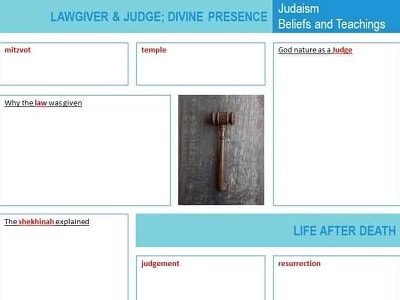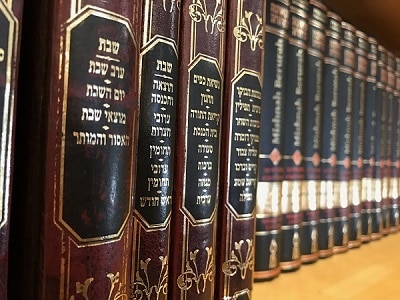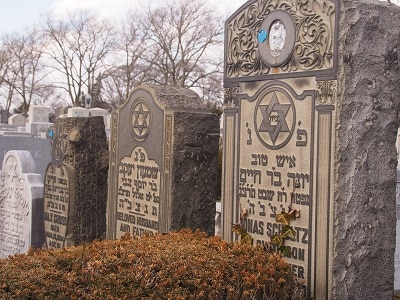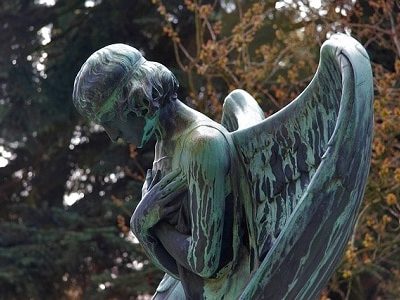JUDAISM BELIEFS & TEACHINGS
Lawgiver & Judge; Divine Presence; Life after Death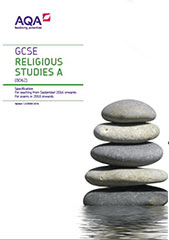
-
God as Law-Giver and Judge, loving and merciful
-
The divine presence (Shekhinah)
-
Beliefs about life after death, including judgement and resurrection
‘Moses saw that though the bush was on fire it did not burn up.’
Exodus 3:2
‘… and the dust returns to the ground it came from,
and the spirit returns to God who gave it.’
Ecclesiastes 12:7
Lawgiv er, Judge & Divine Presence
Explain two ways in which the nature of God as Judge influences Jews today. (4)
2019
• God’s judgement means that Jews believe they must live up to God’s expectations / Jews believe that God judges humanity throughout their lifetime during Rosh Hashanah and Yom Kippur / Jews are encouraged to repent and repair any damaged relationships with others in order to please God / and have a positive comment in their book of life
• Some Jews also believe that they will be judged as to how they have obeyed God at the end of their life / the righteous will live on in Gan Eden / those who need to be cleansed will be sent to Sheol to learn from their mistakes / some Jews believe that at the end of time God will judge the righteous from the wicked and those in between / regardless of which belief they follow it means that they must obey his commandments and lead a life that pleases God
• God gives laws to guide the Jews to live a life that is pleasing to him / Jews are expected to follow God’s laws (mitzvot) to show their obedience to him / through following the laws Jews are showing they are God’s chosen people / how an individual can become a Mensch (a person of integrity) / acts of loving kindness (gemilut chasadim), etc.
Note: maximum two marks where the response includes the nature of God as judge without mentioning the influences on Jews.
Explain two ways in which belief about God as Judge influences Jews today. (4)
2022
• God as Judge has given laws (mitzvot) for his people to obey and it is on their obedience to these laws that he will fairly judge them / this encourages Jews to obey God’s laws / in order that God’s fair judgement will be favourable to them.
• Jews can trust that God will judge them fairly / gives them confidence that they will be rewarded if they follow God’s laws.
• God judges humans throughout their lifetime / Yom Kippur Jews are influenced and encouraged to repent and atone for any harm they may have caused others / in order to be judged favourably by God / and have a positive comment in their book of life.
• Some Jews believe that they will be judged at the end of their life as to how they have obeyed God / those God judges to be righteous will live on in Gan Eden (heaven) / as befits God’s chosen people / souls are sent to Sheol to wait for judgement / this influences Jews to obey God in order to live on with God / some Jews believe that at the end of time God will judge the righteous from the wicked and those in between / regardless of which belief they follow, it means that they must obey his commandments and lead a life that pleases God, etc.
Explain two Jewish beliefs about the divine presence (Shekhinah). (5)
2020
• Belief in presence of God shows God’s immanence / hence Jewish people encouraged to believe God is within the world and active.
• Translates as dwelling or setting found in rabbinic literature / interpretations of scriptural references / so Shekhinah is dwelling or settling of divine presence.
• Represents feminine attributes of presence of God / Shekhinah a feminine word in Hebrew.
• Shekhinah was present as part of the Tabernacle after it had been completed and consecrated / Exodus describes cloud covering the Tent of the Meeting / taken into battle to protect Israelites / dwelling in Holy of Holies in temple in Jerusalem.
• Thought to be shown via a pillar of dust or fire ahead of the Israelites whilst they wandered in the wilderness / guide to Promised Land.
• Shekhinah considered present when people meet in worship or discussion of Torah / if two sit together and the words between them are of the Torah, then the Shekhinah is in their midst (Rabbi Hananiah ben Teradion) / if ten men sit together and occupy themselves with the Law, the Shekhinah rests amongst them (Rabbi Halafta ben Dosa) / whenever ten are gathered in prayer, there the Shekhinah rests – Talmud Sanhedrim 39a.
• Amidah prayer – Blessed are you, God, who returns His presence to Zion.
• Genesis – the Spirit of God moved across the face of the waters / Shekhinah as spirit of God is involved at creation.
• Ezekiel – ‘there was the glory of God before me, as in the vision I had seen in the plain’ / Shekhinah is the glory of God.
• Many Jews believe that Shekinah is present in physical spaces such as the synagogue, temple and places of pilgrimage, etc.
Life after death
Give two Jewish beliefs about life after death. (2)
2018
In Judaism there is the idea of Sheol, described as a dark shadowy place / there is the idea of Olam Ha-Ba which is the world to come / after the soul has been purified then it may move onto Gan Eden which is where the soul will be reunited with its ancestors / there is the idea of Gehinnom where wicked souls are punished / God will judge the soul to decide where it will go / some Jews believe in the idea of resurrection where all souls will be raised at the end of time when the Messiah comes / some Jews believe in the idea of reincarnation / many Jews believe that the soul is immortal / other Jews do not believe that the afterlife is an important belief / Judaism focuses on life in this world, not the next, etc
‘The resurrection is not an important Jewish belief.’ (12)
Spec 1
Arguments in support
very little in the Tenakh on the resurrection, if it were an important belief it would appear more frequently
reform Jews would argue that this belief is not very important some believe righteous will rise, others wicked and righteous will be resurrected/some argued that those to be resurrected would be brought back to Israel so very little agreement and little support from texts
many Reform and Liberal Jews believe that what is important is how life is lived on earth/Whatever happens after death is in God’s hands etc.
Arguments in support of other views
Orthodox Jews believe in the bodily resurrection of the dead/Rabbinical scholars have argued that at the end-of-days the dead would be brought back to life/beliefs in Gan Eden, Olam HaBa, Sheol, Gehenna
Rabbis have used Daniel 12.2 to argue for the importance of everlasting life
It is important because it is believed that Judgement will occur after the Messiah comes/belief in resurrection has an effect on this life/idea of punishment or reward after death depending on how this life has been led etc.
Lawgiver
Lesson slides: The importance of Law in Judaism; why it was given; and the concept of God as a Judge

God as Lawgiver
The concepts of God as both lawgiver and judge, and how this influences Jews and non-Jews.

Shechinah
The concepts of Shechinah: the divine presence of God

